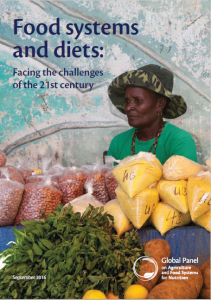Foresight 1.0
Download EXECUTIVE SUMMARY in English, French, Portuguese, or Spanish.
 The Global Panel on Agriculture and Food Systems for Nutrition published its new Report, Food systems and diets: Facing the challenges of the 21st century on the 23rd September 2016.
The Global Panel on Agriculture and Food Systems for Nutrition published its new Report, Food systems and diets: Facing the challenges of the 21st century on the 23rd September 2016.
This evidence-based Report is designed to help policymakers make their food systems more supportive of high quality diets.
The need for action on malnutrition
Poor diet is the number one risk factor driving the world’s disease burden.
Three billion people from 193 countries now have low quality diets and nearly half of all countries are experiencing the simultaneous problem of serious levels of undernutrition, overweight and obesity. Yet our global understanding about the quality of our diets is limited.
The Report
Using modelling and trend analysis, the Report generates a new understanding of diets and food systems, and how they could change by 2030.
The analysis shows that if current trends continue, by 2030 nearly half of the world’s adult population will be overweight or obese, up from one third today. The poorest countries are not immune to these trends.
It also shows how these trends have enormous economic impacts at the macro and micro levels, as well major consequences for mortality and morbidity. For example, at the macro level, cost are estimated to represent an annual loss of 10% global GDP, equivalent to a global financial crisis every year.
Drawing on over 250 data sources and peer-reviewed articles, the Report lists a series of recommendations for policymakers in low and middle income countries through a ‘Call to Action’.
The Report presents evidence showing that the risk that poor diets pose to mortality and morbidity is now greater than the combined risks of unsafe sex, alcohol, drug and tobacco use.
But, as the Report shows that there are many opportunities for action within the food system.
A Call to Action
This Report identifies decisions that policymakers need to take in the coming decade, particularly for women and children, to invest in effective policies to reduce all forms of malnutrition, repositioning food systems from feeding people to nourishing people.
Actions which go beyond agriculture to encompass trade, the environment and health, harnessing the power of the private sector and empowering consumers to demand better diets.
Enhancing the ability of food systems to deliver high quality diets is a choice that is well within the grasp of policymakers. It is a choice that will help achieve the SDG goal of ending malnutrition in all its forms by 2030. It is a choice that will reap benefits for decades to come, for all people, in all countries.
Only a response on the scale and commitment used to tackle HIV/AIDS and malaria will be sufficient to meet the challenge, particularly in low- and middle-income countries.
“This Report makes clear the enormous challenge posed by malnutrition and poor diets generally to the detriment of many millions of individuals and indeed whole economies.”
Sir John Beddington, Co-Chair of the Global Panel, and former UK Chief Scientific Advisor
#Malnutrition holds us back. Changing #FutureDiets will unleash global potential: https://t.co/auwlrXw8qu #SDGs pic.twitter.com/kNpBSIjRKL
— Global Panel (@Glo_PAN) September 23, 2016
